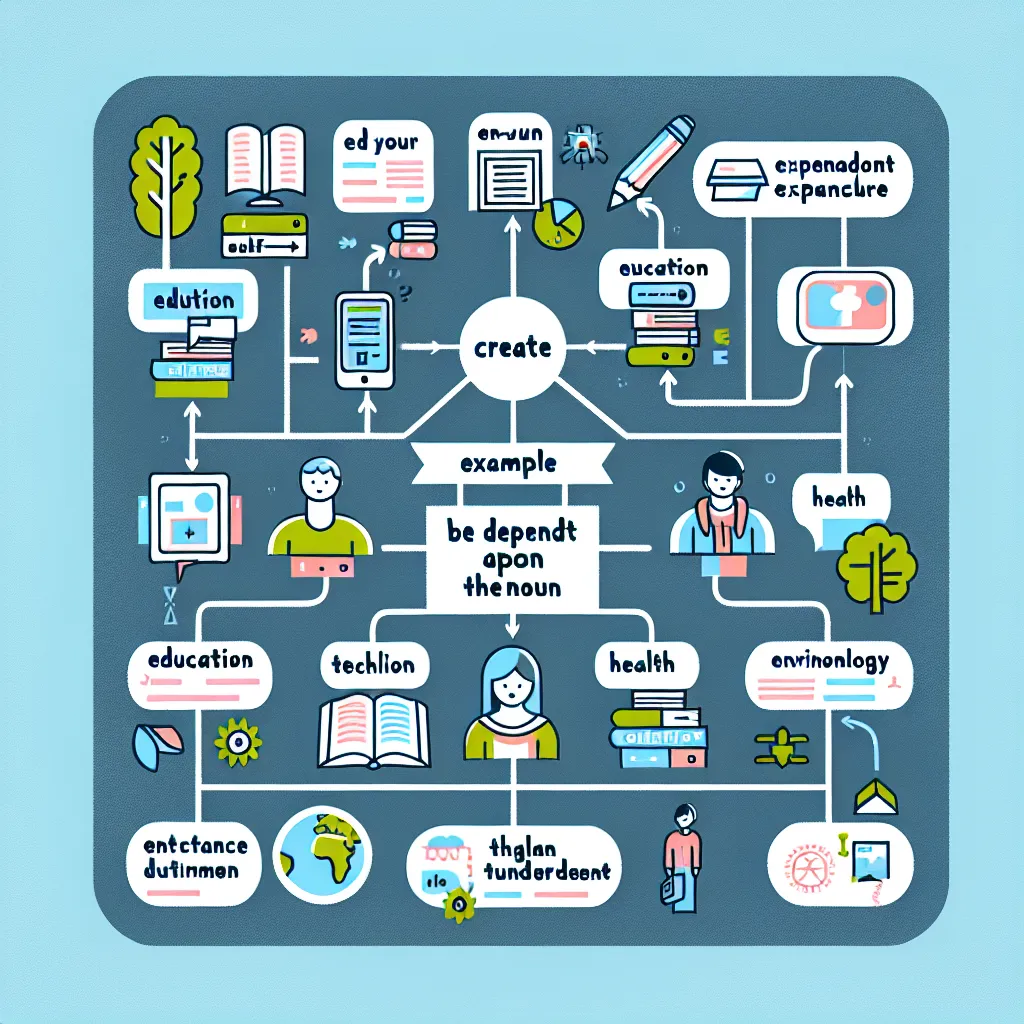The “be dependent upon + noun” structure is a crucial grammatical pattern that frequently appears in IELTS exams. Understanding and effectively using this structure can significantly enhance your performance across all sections of the test. Let’s delve into its meaning, usage, and application in IELTS contexts.
Understanding the “Be Dependent Upon + Noun” Structure
The phrase “be dependent upon + noun” expresses a relationship of reliance or contingency between two elements. It indicates that one thing relies on or is determined by another. This structure is commonly used in academic and professional contexts, making it particularly relevant for IELTS candidates.
Formula:
Subject + be (is/are/was/were) + dependent upon + noun/noun phrase
Examples:
- The success of the project is dependent upon teamwork.
- Economic growth is often dependent upon innovation.
- Our survival is dependent upon the health of our planet.

Frequency in IELTS
This structure appears regularly in IELTS reading passages, especially in academic texts discussing relationships between various factors. It’s also valuable for writing tasks and speaking responses, allowing candidates to express complex ideas concisely.
Applying “Be Dependent Upon + Noun” in IELTS Sections
IELTS Reading
In reading passages, recognizing this structure can help you understand relationships between concepts quickly.
Example passage:
“The success of coral reefs is dependent upon a delicate balance of environmental factors. Water temperature, sunlight penetration, and nutrient levels all play crucial roles. Any significant change in these conditions can have far-reaching consequences for the entire ecosystem.”
Analysis: This structure helps convey the intricate relationship between coral reefs and environmental factors, emphasizing the fragility of the ecosystem.
IELTS Writing
Incorporating this structure in your essays can demonstrate sophisticated language use and clear logical connections.
Task 2 example:
“In today’s globalized economy, the prosperity of many nations is dependent upon international trade. While this interconnectedness brings numerous benefits, it also exposes countries to global economic fluctuations.”
Analysis: Using this structure helps to establish a clear relationship between national prosperity and international trade, setting up a nuanced discussion of advantages and disadvantages.
IELTS Speaking
Employing this phrase in your responses can showcase your ability to express complex ideas fluently.
Example response to “Describe an important decision you’ve made”:
“The decision to pursue higher education was dependent upon several factors. My career aspirations, financial situation, and family support all played crucial roles in this choice.”
Analysis: This structure allows for a concise yet comprehensive explanation of the decision-making process, demonstrating both language proficiency and critical thinking.
Advanced Usage for Higher Band Scores
To aim for higher band scores (7+), consider these advanced applications:
-
Combine with other complex structures:
“The extent to which a country’s economy is dependent upon fossil fuels determines its vulnerability to global energy price fluctuations.” -
Use in conditional sentences:
“If the success of the program were less dependent upon government funding, it might be more sustainable in the long term.” -
Incorporate into comparisons:
“Developing nations are often more dependent upon foreign aid than developed countries, which can lead to economic instability.”
Common Mistakes and How to Avoid Them
-
Incorrect preposition:
Incorrect: “The project is dependent on funding.”
Correct: “The project is dependent upon funding.” -
Misuse of tenses:
Incorrect: “The experiment’s success will be dependent upon careful preparation.”
Correct: “The experiment’s success is dependent upon careful preparation.” -
Overuse:
While this structure is effective, overusing it can make your writing repetitive. Vary your language with synonymous phrases like “relies on,” “is contingent on,” or “hinges on.”
Conclusion
Mastering the “be dependent upon + noun” structure can significantly enhance your IELTS performance. Practice incorporating it into your writing and speaking to express complex relationships clearly and concisely. Remember to use it judiciously and in conjunction with a variety of other advanced structures to showcase your language proficiency.
For further practice, consider exploring related structures like “be reliant upon + noun” and “be contingent upon + noun”. These alternatives can help you diversify your language use while expressing similar concepts.